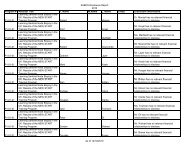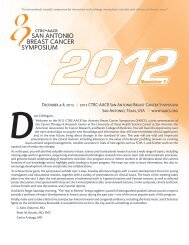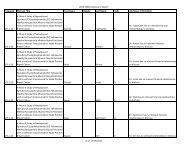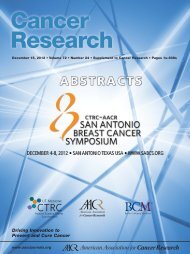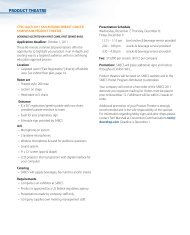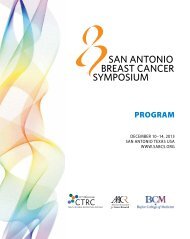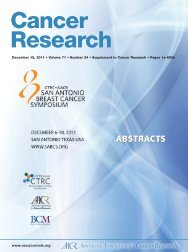Issue 1 - San Antonio Breast Cancer Symposium
Issue 1 - San Antonio Breast Cancer Symposium
Issue 1 - San Antonio Breast Cancer Symposium
Create successful ePaper yourself
Turn your PDF publications into a flip-book with our unique Google optimized e-Paper software.
Abstract 112<br />
Prediction of 10-year chemotherapy benefit and breast cancer-specific survival by the 21-gene Recurrence Score (RS) assay in<br />
node-positive, ER-positive breast cancer—An update of SWOG-8814 (INT0100)<br />
Albain KS, Barlow WE, Shak S, Hortobagyi GN, Livingston RB, Yeh I-T, Ravdin P, Bugarini R, Baehner FL, Davidson NE, Sledge<br />
GW, Winer EP, Hudis C, Ingle JN, Perez EA, Pritchard KI, Shepherd L, Gralow JR, Yoshizawa C, Allred DC, Osborne CK, and<br />
Hayes DF for The <strong>Breast</strong> <strong>Cancer</strong> Intergroup of North America. Loyola University Chicago Cardinal Bernardin <strong>Cancer</strong> Center,<br />
Maywood, IL.<br />
Background: A low 21-gene RS identifies patients with ER-positive breast cancer who do not appear to benefit from anthracyclinebased<br />
chemotherapy (CAF) added to tamoxifen (T) despite positive axillary lymph nodes (Albain KS et al, Lancet Oncology, in<br />
press). However, in the low RS group, the lack of improvement by CAF in the 64% disease-free survival (DFS) at 10 years is not<br />
considered definitive evidence against the use of chemotherapy for conventionally identified high-risk patients. We conducted<br />
new DFS prediction analyses within nodal categories by RS over 10 years and assessed whether the assay has predictive utility for<br />
breast cancer specific survival (BCSS).<br />
Methods: RT-PCR analyses for the 21 gene RS assay were feasible in 148 patients on T from the parent trial and 219 on CAF<br />
followed by T, as previously described. In this update, we conducted 10-year DFS analyses within nodal categories 1-3+ and 4+<br />
by the linear RS. For the exploratory analysis of BCSS, only deaths due to breast cancer were counted as events, censoring deaths<br />
due to other causes (such as late cardiovascular events), as well as patients alive at the last follow-up visit. The clinically utilized<br />
(trichotomized) RS categories of low (




